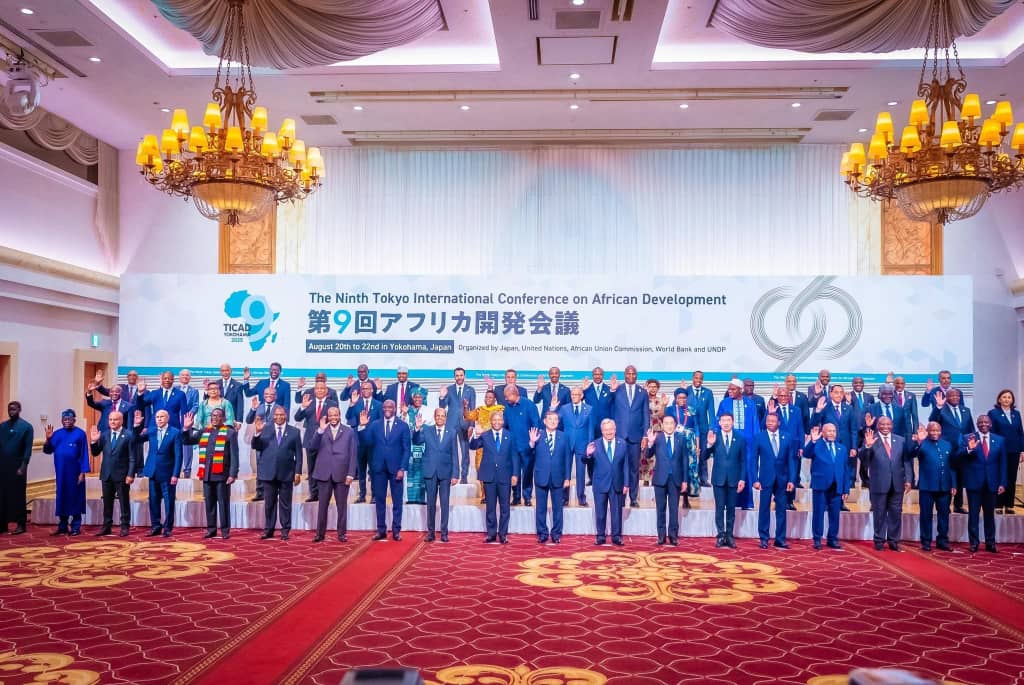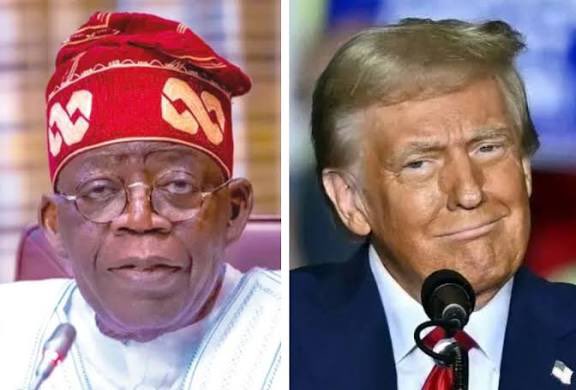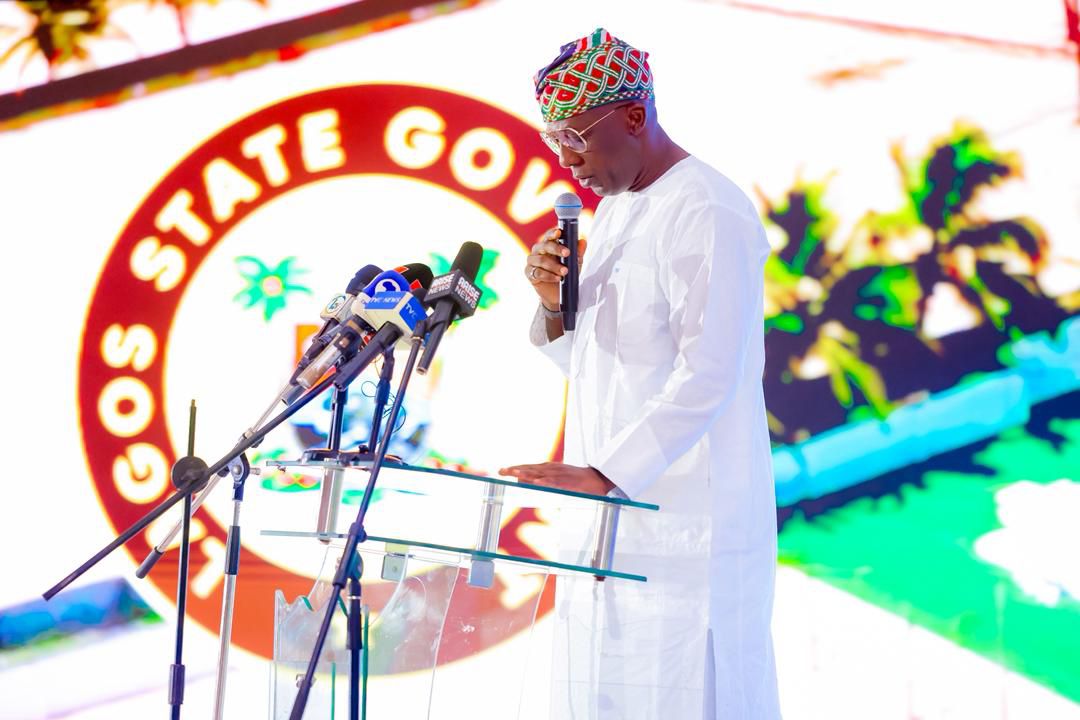Nigeria At TICAD9: Forging A Stronger Partnership With Japan
BY TEMITOPE AJAYI

When Prime Minister Shigeru Ishiba addressed African leaders and multilateral development partners who converged on the port city of Yokohama at the just-concluded 9th Tokyo International Conference, he was clear about the impending mission.
Delving into the summit’s history, which started in 1993 as his launching pad, the Prime Minister said the idea of TICAD was founded on the basic principles of African ownership of her growth and development priorities, even as it seeks cooperation and international partnership.
He underscored the importance of mutual understanding, indigenous solutions, and collaborative efforts for Africa’s development.
As the host, he outlined his government’s focus on private sector-led sustainable growth, youth and women’s empowerment, and regional integration while speaking on the theme: “Co-create innovative solutions with Africa.”
At the head of the Nigerian delegation was President Bola Tinubu, who had embarked on a whirlwind of diplomatic shuttles and engagements in the last two years, making the voice of Nigeria loud and strong on how the country and the rest of Africa should engage the world.
During his intervention at the plenary session on ‘Peace and Stability’, President Tinubu underscored the importance of security to the economic growth and the collective prosperity of Africans and Nigerians in particular, stressing that Africa would remain mired in underdevelopment and consigned to a mere footnote in global affairs if conflicts and insecurity are not effectively tackled.
While reaffirming Nigeria’s readiness to partner with Japan and other global development agencies to co-create solutions that address the development challenges of his country and the rest of Africa, President Tinubu declared that inclusivity, diversity, and the rule of law, which are essential ingredients for economic growth, are already entrenched in Nigeria’s social and political fabric.
He described the current momentum of the Nigerian Armed Forces’ fight against terrorists and other forces of destabilisation as a springboard for national development and stability.
Decrying how conflicts and poor management of political differences undermine the much-needed progress in Africa, President Tinubu referenced the economic reforms his administration is spearheading in Nigeria as a pointer to the revitalisation that is possible with the right investments in critical infrastructure, institutional reforms, and collaboration with civil society and international partners to improve the living standards of all citizens.
Calling for a new approach and fresh thinking in conflict resolution in Africa, President Tinubu acknowledged how a new model of mediation buoyed by economic considerations is resolving the decades-long civil war in the Democratic Republic of the Congo.
“We should be under no illusions about the scale of our task. But neither should we underestimate the successes we have had. In the past, competition for resources has weakened states and triggered conflict. Now, we see mediators directly linking outcomes to investment in Congo. It is working and underlines the need for fresh thinking in everything we do to deliver peace and stability,” he said.
In his well-received intervention, President Tinubu appealed to the government of Japan, the 5th largest economy in the world, for a more impactful investment in job-creating sectors of the Nigerian economy and in the rest of African countries, market-driven cooperation and partnerships that will eliminate poverty among the teeming population, rather than the hackneyed appeals for aid and handouts.
President Tinubu seized the opportunity to call on Japan to support the campaign for reforms in the United Nations’ organs, especially the United Nations’ Security Council, to give African countries a greater voice.
“It is the view of Nigeria that Africa’s quest for fair and equitable representation in the UN Security Council is a just and fair demand. Indeed, Africa deserves two seats in the Permanent Category, with all its prerogatives and privileges, including the Right of Veto. Africa also deserves additional seats in the non–permanent seat category of the Security Council, as encapsulated in the Ezulwini Consensus and the Sirte Declaration.”
While laying out the new template for cooperation between Japan and Africa, Prime Minister Ishiba emphasised that locally rooted solutions that leverage the advantages of both Japan, the 5th largest economy in the world, and Africa, with a vast and vibrant young population, are essential for economic growth and development.
The Prime Minister appealed to African countries to assist Japan as it grapples with the challenges of a declining population and shrinking agricultural land.
“In 75 years from now, the population of Japan would have been halved. In the local communities, the population continues to decline; this is one big challenge Japan is facing. All agricultural land is being reduced, another major challenge for Japan. There is another potential in Africa: a growing young population, but for the power of young people in Africa to flourish, you need to create a manufacturing industry and create employment, which is very important. Solving challenges is not a one-way street. I would also like Africa to lend its strength to solving Japan’s challenges.”
In addressing the problem of poverty and unemployment, Japan promised to work with African leaders to make the continent the next growth centre and build the capacity of youth and women to be employable.
“Recognising this, we will implement human resource development for 300,000 people over three years. Through the “AI and Data Science Human Resource Development and Africa Economic Growth Initiative,” we will develop 30,000 AI industry personnel in Africa over three years,” the Prime Minister said.
As part of the TICAD9 commitment, Prime Minister Ishiba announced investments in Africa’s health sector based on the “Investment Promotion Package for Sustainable Health in Africa.” The Universal Health Coverage (UHC) Knowledge Hub will be established in Japan this year, and the development of 35,000 health and medical personnel will contribute to achieving UHC in African countries. He unveiled Japan’s mission to support Africa’s vaccine supply through contributions of up to $550 million over the next five years to Gavi, the Vaccine Alliance.
According to Prime Minister Ishiba, Japan started Kaizen training in Tunisia to boost industrialisation and improve the productivity of Africa’s manufacturing sector. This has now been expanded to 41 African countries. To date, the number of Kaizen trainers has reached 1,400, contributing to productivity improvements at 18,000 companies that generate employment for 280,000 people. Through this Kaizen approach, companies’ productivity in the 41 African countries has reportedly improved by more than 60%.
Promising to do more to expand the manufacturing base in Africa and access to finance, the Prime Minister added, “We will nurture and expand the industrial ecosystem between Japan and Africa. We will advance “Japan Africa Co-Creation for Industry,” an initiative in which African startups and Japanese companies jointly develop industries. In terms of finance, we will strengthen the functions of the “Enhanced Private Sector Assistance for Africa,” a collaborative framework between Japan and the African Development Bank, expanding it to a maximum of $5.5 billion. We will mobilise $1.5 billion in public-private impact investment, using Japan International Cooperation Agency’s Private Sector Investment Finance as a catalyst.”
Beyond the African-wide initiatives and the private sector funding assistance through the African Development, Nigeria’s participation at TICAD9 recorded major milestones and tangible results that will further accelerate progress already being made in key sectors of our economy, especially in the power and health sectors.
Specifically, the Minister of Power, Adebayo Adelabu, led Nigeria’s power sector delegation to conclude negotiations and activation of several Japan-backed energy projects and had productive engagements with top equipment manufacturers.
One of the power projects is the Lagos-Ogun Power Transmission System Improvement, which is designed to improve the wheeling capacity and grid stability and enable the connection of industrial customers on the corridor. There is also the partnership between the National Power Training Institute (NAPTIN) and JICA to enhance Vocational Training Delivery for the power sector. The third power project is the Distributed Access Through Renewable Energy Scale-up, for which $190 million has been provided.
Speaking on the outcomes of his sideline engagements at TICAD9, Adelabu said, “We’re engaging with Toshiba and Hitachi facilities tied to upcoming grid infrastructure, and with Japan’s Transmission and Distribution Corporation and Energy Exchange to share best practices and loss-reduction strategies.
The signed project includes technical training and loss reduction; the equipment is installed at NAPTIN in Abuja. We’re activating a $190M JICA renewable energy facility, complementing Nigeria’s $750M World Bank clean energy fund under Mission 300. We are also finalising plans to commission three JICA-funded substations in Apo and Keffi (FCT) and Apapa (Lagos), delivered via a $32M Japanese grant. This is moving from agreement to action, planning to implementation and promise to results.”
Also, on the sidelines of the conference, Minister of Solid Minerals, Dr Dele Alake, and his team had a productive meeting with the officials of the Japan Organisation for Metals and Energy Security (JOGMEC). JOGMEC pledged to devise plans to encourage Japanese mining companies to invest in Nigeria’s mining sector.
President of JOGMEC, Mr. Michio Daito, acknowledged that Nigeria’s rich mineral resources are well known globally, but Japanese mining companies need more information to make investment decisions.
He raised issues about power generation for industries, tax incentives, labour, duty waivers, free trade zones, and entry and exit conditions. Noting that Japanese mining firms rely on JOGMEC to make investment decisions in foreign countries, Daito requested information on the state of infrastructure that supports mining.
Dr Alake highlighted the reforms of President Bola Tinubu’s administration, especially monetary policy, tax, and fiscal policy reforms, which have made the business environment more stable and conducive.
Acknowledging the industrial nature of the Japanese economy and the role of electric technologies, Alake said Nigeria would be critical to Japan’s needs for processed minerals to drive its economy.
He encouraged JOGMEC to invest in the extraction and processing of its mineral needs in Nigeria before exports to Japan in line with the administration’s policy on local value addition.
Addressing other investment concerns, Dr Alake rated the Nigerian workforce as one of the best in the world because of high literacy and education levels. He assured the investors that the Tinubu administration had embarked on critical infrastructure projects in rail, road, and water transportation to support industries.
“In terms of economies of scale, producing and processing the critical minerals you need in Nigeria is cheaper and more profitable as the production costs are lower, the Minister said.
The minister informed the Japanese government of Nigeria’s new electricity law, which allows industries to generate their own power and manage their own needs.
A major interesting element of TICAD9 was the elevation of cultural diplomacy and people-to-people connection to higher pedestal with the naming of the city of Kisarazu as the Hometown for Nigerians by the Japan International Cooperation Agency under the “JICA Africa Hometown.”
JICA, in a ceremony on Thursday, August 21, also named the cities of Nagai in Yamagata Prefecture the Hometown of Tanzania, Sanjo in Niigata Prefecture the Hometown of Ghana, and Imabari in Ehime Prefecture the Hometown of Mozambique.
Under this initiative, the government of Japan aims to further strengthen existing relationships with the four African countries by connecting municipalities with the four countries in Africa.
Nigeria’s Charge d’Affaires, Mrs. Florence Akinyemi Adeseke, also the Acting Ambassador to Japan, and Mr. Watanabe Yoshikuni, the Mayor of Kisarazu, received the certificate from JICA naming Kisarazu the Hometown of Nigeria.
In all, Nigeria had a great outing at TICAD9, with President Tinubu leading the charge and representing Nigeria at the highest level of government, signifying a strong bond between Nigeria and Japan. The biggest takeaway from the conference is Japan’s commitment to collaborate in co-creating solutions to development challenges in Nigeria and the rest of Africa, as well as inspiring a win-win partnership.
–Ajayi is Senior Special Assistant to President Tinubu on Media and Publicity












